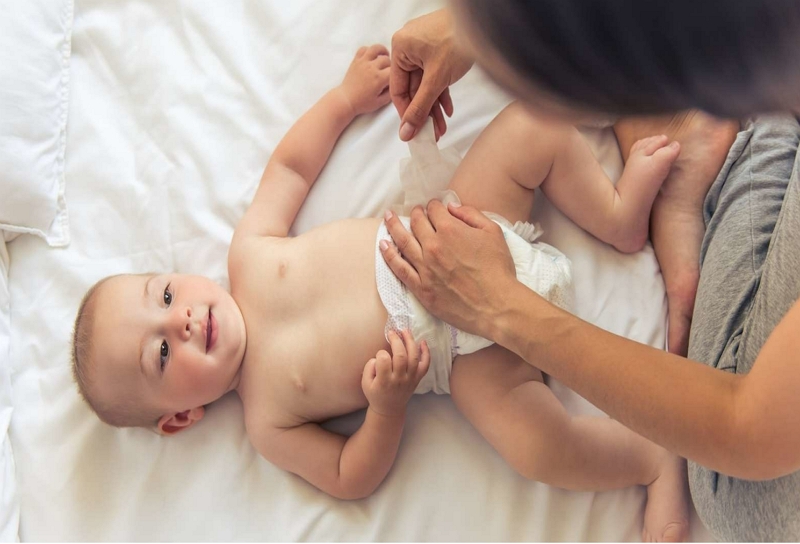What size diapers for 5 month old? Your baby is five months old, and you probably have tons of diapers at home. You might be wondering if there are different sizes for your little one’s diaper? The answer to that question is yes! Just like adults, babies also come in different shapes and sizes.
Typically speaking, an average newborn or infant will fit into the Newborn Stage (NB) range before moving up to Size One (SIO), which fits until six pounds.

After this stage comes Size Two (SIO) which can last up to ten pounds; then the next four stages after this follow with weight increments of roughly two pounds each level including Size Three (SO], Four [S], Five [M] & Six ([L]). However these should only be used as a general guideline, and it is always best to consult the diaper’s measurements on its packaging to get an accurate size.
Now that you know what size your baby needs, what are some of the different types of diapers? There are many options on the market these days including cloth and disposable diapers.
Some parents find that they prefer one over the other while others mix and match between the two. Ultimately, it is up to each family to decide what type of diapering system works best for them!
There are also variations in terms of absorbency levels for both disposable and cloth diapers. You might want to consider how active your child is when making your decision; if they’re constantly wetting through their disposables or leaking through their cloth diapers, you might want to consider a diaper with more absorbency.
To determine this level of absorbency, look at the letters used after each size such as [S] = Super Absorbent or [L]= Leakguard protection.
When should I be concerned about my baby sleeping through the night?
In general, by six months of age, most babies have developed good sleep habits and patterns. By this time, they typically sleep on a more predictable schedule with fewer nighttime feedings and longer stretches of sleep during the nighttime hours.
Most paediatricians will tell parents that they shouldn’t be concerned about their baby sleeping through the night until after six months of age because it is too early to determine if your infant has an underlying medical condition called “sleep-wake disorders”. However, most babies can develop healthy sleep habits without any problems by this period.
If you feel like something may be wrong or perhaps there was some sort of disruption in your infants day-night routine which caused him not to be able to stay asleep for long periods at night then its best to speak with your doctor so that he can help address these issues before assuming anything serious is going on.
When can I start feeding my baby solid foods?
The American Academy of Pediatrics (AAP) recommends that parents wait until their child is six months old to introduce solid foods into their diet. This is because your infant’s digestive system isn’t mature enough at this age to properly digest and absorb the nutrients from solid foods.
Your paediatrician might recommend starting with iron-fortified cereals since they are a good source of essential nutrients for infants. You can then progress onto other types of solids such as fruits, vegetables and meats as your baby becomes more accustomed to eating solid foods.
If you have any questions about when or how to start feeding your baby solid foods, be sure to speak with your doctor who will be able to answer any questions that you might have.
What are some signs of my baby being sick?
One of the most common symptoms in infants is when they refuse to eat or drink anything for more than several hours at a time. This happens because their digestive system is unable to process solid foods effectively if it has an infection or may not be working properly due to another underlying condition such as cystic fibrosis .
If your baby isn’t eating and drinking then he will become dehydrated which can lead to dangerous effects on his overall health including seizures, coma, permanent brain damage and even death.
Other possible signs that your baby could have an illness include fever over 100 degrees Fahrenheit, vomiting repeatedly, diarrhoea with blood present, discolouration around eyes or mouth from lack of oxygen, lethargy or irritability and difficulty breathing.
If you notice any signs that your infant is ill then it’s best to speak with a doctor as soon as possible so they can help rule out anything serious going on before the condition worsens. They may recommend performing some tests such as blood work or taking an x-ray just so they have more information about what might be going on inside his body.
Don’t forget to ask your doctor questions during your appointment if there are things which you feel concerned about regarding your baby’s health!
How many wet diapers should a 15-month-old have a day?
A 15-month-old should have anywhere from three to five or six wet diapers a day. Some days, they may not even go through one diaper if the child is breastfed and does not drink too much at once during feedings.
They will likely only need four or five changes of clothes (diapers) each day since their eliminations are smaller than that of an adult’s.
However, if your baby has diarrhoea for any reason, then you can expect them to have more bowel movements in addition to all the other changes throughout the day so it would be best to take extra clothing with you when leaving home just in case!
